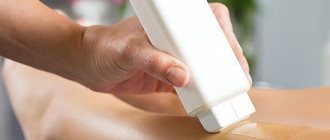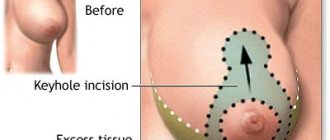Initial consultation
Very often, the result of the first visit can be a categorical refusal to undergo surgical intervention in the body, or a significant adjustment in the planning stages. Often, refusal of plastic surgery occurs due to demanding the impossible from the plastic surgeon. It is worth remembering that surgeons are not magicians who can make unrealistic dreams come true. There is always a certain limit to the capabilities within which a specialist operates. The result of communication with a good doctor will be a compromise that will satisfy the patient’s wishes and also will not contradict medical restrictions.
The decision to have surgery must be weighed. Seek advice from people you trust. Perhaps they still consider your appearance attractive, and therefore will be perplexed as to what “flaw” you decided to part with. In some cases, on the contrary, it is those around you who instill complexes associated with your appearance. So, first of all, think about why you want to have plastic surgery. Is this really an informed decision or a spur-of-the-moment impulse?
Advice from the Plastic Club: approach the issue of choosing your specialist very carefully. Spend your personal time, it will reward you later! Read articles, scour the Internet for photos and videos of work, read reviews about your specialist (just read between the lines, because there are many “dishonest” reviews written by his employees). Find his patients, chat. There are many forums on the Internet, everyone communicates there, and we are no exception - we also have a cool live forum))
The next stage is “trying on” the new appearance. Nowadays computer programs are used to simulate appearance. Therefore, before the operation, the patient can see what his stomach, chest, nose, ears, etc. will become. Think about the fact that your new appearance will stay with you forever. Imagine how comfortable you will be.
Advice from the Plastic Club: it is important after carrying out 3D modeling not to “get hung up” on that “ephemeral” result, because in life everything can turn out differently and even better!
Before surgery, it is important to enlist the support of loved ones. Consult in advance with family and friends, with those people whose opinion and support you need. After the operation there will be a recovery period when you need to follow some rules. For example, limit physical activity. Therefore, the support of loved ones is especially important.
Advice from the Plastic Club: and if you don’t have anyone at the moment (for example, you are from another city), then just visit us on the Plastic Club forum and we will support you before and after the operation!
Plastic surgery makes it possible to correct your appearance and say goodbye to complexes. However, one should not place enormous hopes. Mammoplasty or rhinoplasty is not the best way to keep your lover or fly up the career ladder. The goal of aesthetic surgery is to rid you of imperfections that cause discomfort.
Consultation before shin augmentation
The next, no less important stage in preparing for surgery is a consultation with a plastic surgeon.
Consultation, in addition to the informational aspect, has a very important psychological significance.
During the consultation, the surgeon gets an idea of the patient’s expectations and desires, which is very important for the final result of the operation.
Answers all questions that interest him, both about the operation itself and about the rehabilitation period.
At the consultation stage, the surgeon takes all the necessary measurements, discusses possible options for the operation, explains the factors that may affect the operation and its final result.
The surgeon introduces the patient to the possible approximate result of the operation that the patient can expect after it is performed.
Possible risks, limitations and complications associated with the operation, as well as the healing process, are discussed and analyzed.
The patient must prepare in advance all the questions that interest him, both in preparation for the operation, the operation itself and the postoperative period. It is also necessary to inform the surgeon about all your diseases and provide a complete list of medications taken during a given period of time.
The surgeon’s task during the consultation is to form in the patient a realistic idea of the possibilities of cruroplasty.
At the end of the consultation, the surgeon gives recommendations that must be followed in the preparatory period for the operation.
The actual preparation for a breast lift
If you are over 40 years old or have any diseases of the mammary glands, a consultation with a mammologist, and often additional studies, such as ultrasound or mammography, is indicated.
Breast lift surgery is mentally and psychologically stressful, and therefore, before the operation, it is necessary to rest well and eat well, eating enough meat, fruits and vegetables. An unfavorable factor for healing after a breast lift is smoking. Many substances contained in tobacco smoke are known to interfere with healing; Nicotine, for example, causes blood vessels to constrict. Insufficient blood circulation in the surgical area increases the risk of postoperative complications and poor wound healing. Thus, at least two weeks before breast lift surgery, I recommend that smokers stop smoking altogether, and then quit this bad habit.
Before breast lift surgery, you must stop taking medications that reduce blood clotting, such as acetylsalicylic acid (aspirin).
You should avoid taking these medications 14 days before and for a week after breast lift surgery.
After breast lift surgery, you must wear special compression garments—a bra—for two to three weeks. It is advisable to select and try it on in advance. Usually you can pick it up and purchase it at the clinic.
Psychological characteristics or high expectations
The question is very subtle and very complex with many nuances. The patient's high expectations are manifested in his desire to achieve impossible results.
Some girls see plastic surgery as a panacea for all their problems, which, naturally, cannot be provided by any surgical intervention of this kind.
Inflated expectations are sometimes very dangerous, because a person’s problems are purely psychological in nature, and he turns to a surgeon. In this case, the help of a psychologist is most likely required. At a certain point, the doctor still understands that plastic surgery in a particular situation is not a solution to the problem.
What tests are taken during plastic surgery?
The laboratory complex requires the following tests before plastic surgery:
- General blood analysis.
The study involves determining the level of cellular elements in the patient's blood - red blood cells, platelets, leukocytes, lymphocytes and monocytes. Also, this laboratory test allows you to establish such important indicators as hemoglobin level and erythrocyte sedimentation rate, on the basis of which the doctor will make a conclusion about the general health of the patient. A general blood test before plastic surgery is given to exclude the patient from acute infection, inflammation, blood diseases and severe forms of anemia. Also, the results of the study may raise suspicion of immunodeficiency conditions, in which surgical intervention is strictly contraindicated. To donate blood for a general analysis, no special preparation is required. The only condition is that you must submit the material on an empty stomach. - Blood chemistry
. This study of the patient’s blood allows us to draw conclusions regarding the state of internal organs and systems, due to the fact that biochemistry determines several dozen important chemical indicators. Biochemical research reveals to the specialist the state of protein, lipid, nitrogen and pigment metabolism. Also, this laboratory analysis makes it possible to determine the level of glucose in the blood and electrolyte composition. Blood biochemistry before plastic surgery makes it possible to exclude such dangerous pathological conditions of the body as renal failure, cirrhosis of the liver, hepatitis, diabetes mellitus, oncological conditions, etc. - Blood test for prothrombin
. The study is necessary to determine blood clotting ability, which is very important during surgery. This is primarily due to the high probability of such postoperative complications as bleeding. - Blood test for RW, HIV
. Syphilis, as well as immunodeficiency of any nature, are clear contraindications for any surgical intervention, including plastic surgery. This means that a blood test for RW and HIV must be included in the laboratory complex at the stage of preparation for aesthetic operations. Hbs antigen + anti HCV. The study makes it possible to determine whether a patient has such a dangerous viral disease as hepatitis. This test should never be neglected, since an organism weakened by the hepatitis virus cannot be subjected to additional stress in the form of surgery. - Blood group, Rh factor
. Even the safest plastic surgery performed by an experienced specialist using the latest equipment is a certain risk. Knowing the patient’s blood type and Rh factor, medical specialists can prepare a kind of insurance in case of force majeure. General urine analysis. The study of this biological fluid involves, first of all, determining the qualitative and quantitative composition. Having established the presence and content of protein, glucose, ketone bodies, bilirubin, hemoglobin and other substances, specialists are able to draw conclusions not only regarding the functioning of the kidneys, but also to exclude some infectious and oncological processes in the body. - Electrocardiogram (ECG)
. A healthy heart is the most important condition for the successful performance of any surgical intervention under general anesthesia, including in the field of plastic surgery. That is why the study of the electrical activity of the heart is included in the list of mandatory preoperative diagnostics.
The studies listed above are mandatory in the process of proper preparation for any plastic surgery, regardless of its location and purpose. This entire diagnostic complex should be completed no earlier than ten days before the operation.
Day of surgery
- The patient is admitted to the clinic at 9:00 am on an empty stomach.
- Documents for hospitalization and the patient's medical record are drawn up, and the corresponding consents are signed.
- The anesthesiologist examines and talks with the patient. The patient is escorted to the operating room.
- After anesthesia, depending on the location of the operation, the patient is given the appropriate body position on the operating table.
- The skin of the surgical field is treated with antiseptic solutions
- The surgical field is covered using disposable sterile materials
- A scalpel is used to make 2-3 punctures (for knee joint surgery) of the skin, 5-6 mm each (3-5 punctures for shoulder joint surgery), and a camera connected to a monitor is inserted into the joint.
- A thorough examination of the joint is carried out for chronic changes and traumatic injuries.
- During the operation, the identified problems are solved using surgical methods.
- Wounds are sutured with special metal clips or threads
- Surgical wounds are covered with sterile dressings and sealed with adhesive tape.
Preparing for breast lift surgery
Breast Lift Consultation
At your consultation, we will measure the degree of ptosis by measuring the distance from the collarbone to the nipple and how far the breast hangs below the crease underneath. It is also possible to determine the volume of the mammary glands in one way or another.
It is necessary to determine the locations of future incisions and, accordingly, the location of future scars.
It is important for us to reach mutual understanding regarding the future shape of the breast. If there is little natural gland tissue, and you want to have larger breasts or good filling of the upper pole of the breast, then we can talk not only about a lift, but also about simultaneous breast augmentation using implants. I do this using a technique where I am a co-author
How to properly prepare for surgery and choose a plastic surgeon. What tests need to be taken and how to properly prepare the body for surgery.
Awareness of the need for plastic surgery
The very first thing you need to do before plastic surgery is to understand its necessity. Of course, there is no limit to perfection, and if you think like this, then in every person you can find shortcomings that require some kind of correction. But where is that very line between reasonable necessity and excess? This line is in every person’s head, and it’s different for everyone. Any person first of all wants to please himself, and then others.
Choosing a Plastic Surgeon
This is perhaps the most important stage before plastic surgery. Each patient must decide for himself whether the doctor inspires confidence in him and whether he is able to achieve the result that suits the patient. The result, of course, depends on the experience of the surgeon. But not even the most experienced and expensive surgeon can guarantee an impeccable result. This can happen for 3 reasons:
1. Inflated patient expectations.
2. Features of the body.
3. Technical errors.
It's not always possible to get a nose like a Hollywood star. Each person has his own characteristics that must be taken into account. The body's reaction can be completely different, as a result of which complications are possible (especially in smoking patients) and deviations from the expected result. Technical errors include both inaccuracies made by the surgeon during the operation and the patient’s failure to comply with recommendations in the postoperative period. A minor injury to the operated organ after surgery can ruin even a perfectly performed plastic surgery.
Taking tests
The list of tests may be different in each clinic. If the patient has any chronic diseases that are of concern, the doctor may order additional tests. Typically, the list of tests includes a general blood test, a general urinalysis, an ECG, fluorography, a blood test for antibodies to syphilis, a coagulogram and ultrasound of the mammary glands during breast surgery. The shelf life of tests is 2 weeks, fluorography is 1 year.
Preparing the body for surgery
If you smoke, you should try to give up this harmful habit, at least for a while. Smoking significantly increases the risk of various complications, as the supply of oxygen to damaged tissues is reduced. There are no specific deadlines for which you must give up this habit, but we can say unequivocally: the less you smoke, the better it will be for your body.
If the operation is planned in the morning, you can have a light dinner in the evening. If the operation is planned in the afternoon, a light breakfast in the form of a sandwich and tea is possible in the morning.
If you have been taking any blood thinning medications, you should stop them after consulting with your doctor. As for other medications, their use must be agreed with the doctor.
In addition, before the operation it is necessary to stock up on painkillers and antibiotics (if necessary).
Once again, it is worth saying that no one, even the most experienced surgeon, can guarantee an ideal result, but every plastic surgeon can and should guarantee a humane attitude towards the patient not only during the consultation, but also after the operation. Patient dissatisfaction is a problem for doctors as well.









